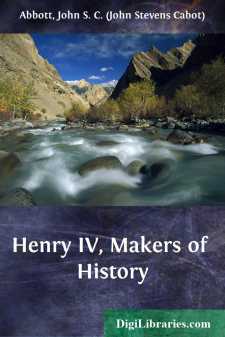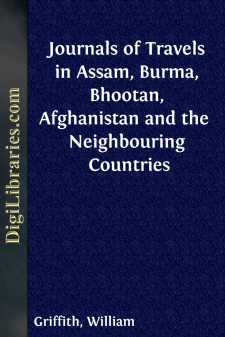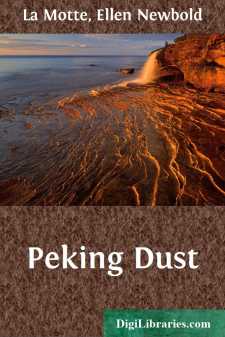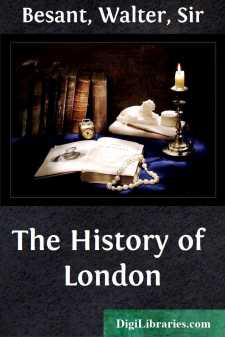History
- Africa 30
- Americas (North Central South West Indies) 50
- Ancient 68
- Asia 58
- Australia & New Zealand 8
- Canada 41
- Caribbean & West Indies 1
- Civilization 20
- Eastern Europe 12
- Europe 310
- Expeditions & Discoveries 60
- General 77
- Historical Geography 1
- Jewish 9
- Latin America 3
- Medieval 8
- Middle East 13
- Military 248
- Revolutionary 8
- Study & Teaching 5
- United States 353
- Western Europe 56
- World 13
History Books
Sort by:
Chapter I. Childhood and Youth. 1475-1564Navarre.Catharine de Foix.About four hundred years ago there was a small kingdom, spreading over the cliffs and ravines of the eastern extremity of the Pyrenees, called Navarre. Its population, of about five hundred thousand, consisted of a very simple, frugal, and industrious people. Those who lived upon the shore washed by the stormy waves of the Bay of Biscay...
more...
by:
Thomas Carlyle
INTRODUCTION Being an appreciation from "The Dial" (July 1843) by Ralph Waldo Emerson Here is Carlyle's new poem, his Iliad of English woes, to follow his poem on France, entitled the History of the French Revolution. In its first aspect it is a political tract, and since Burke, since Milton, we have had nothing to compare with it. It grapples honestly with the...
more...
by:
William Griffith
NOTICE OF WILLIAM GRIFFITH, from the Proceedings of the Linnæan Society, with a few extracts from his private correspondence. “WILLIAM GRIFFITH, Esq., the youngest son of the late Thomas Griffith, was born on the 4th of March 1810, at his father’s residence at Ham Common, near Kingston-upon-Thames, in the county of Surrey. “He was educated for the Medical profession, and completed his studies at...
more...
I POOR OLD CHINA When I came away last August, you said you wanted me to tell you about our travels, particularly about China. Like most Americans, you have a lurking sentimental feeling about China, a latent sympathy and interest based on colossal ignorance. Very well, I will write you as fully as I can. Two months ago my ignorance was fully as overwhelming as yours, but it is being rapidly dispelled....
more...
by:
Walter Besant
1. THE FOUNDATION OF LONDON. PART I. 'In the year 1108 B.C., Brutus, a descendant of Æneas, who was the son of Venus, came to England with his companions, after the taking of Troy, and founded the City of Troynovant, which is now called London. After a thousand years, during which the City grew and flourished exceedingly, one Lud became its king. He built walls and towers, and, among other...
more...
PREFACE It has not been the purpose of the author to write a history of the University of Michigan. Several predecessors in this field have done their work so well that another book entirely historical in character might seem superfluous. Rather it is the aim of this volume to furnish a survey—sketching broadly the development of the University, and dwelling upon incidents and personalities that...
more...
CHAPTER I. Convention of London, February 27, 1884. A Convention Between Her Majesty the Queen of the United Kingdom of Great Britain and Ireland and the South African Republic. Whereas, The Government of the Transvaal State, through its Delegates, consisting of Stephanus Johannes Paulus Kruger, President of the said State, Stephanus Jacobus Du Toit, Superintendent of Education, and Nicholas Jacobus...
more...
CHAPTER I—SENNACHERIB (705-681 B.C.) The struggle of Sennacherib with Judæa and Egypt—Destruction of Babylon. Sennacherib either failed to inherit his father's good fortune, or lacked his ability.* He was not deficient in military genius, nor in the energy necessary to withstand the various enemies who rose against him at widely removed points of his frontier, but he had neither the...
more...
Rutherford B. Hayes Rutherford B. Hayes was born in Delaware: Ohio, October 4, 1822. His father had died in July, 1822, leaving his mother in modest circumstances. He attended the common schools, and began early the study of Latin and Greek with Judge Sherman Finch, of Delaware. Prepared for college at an academy at Norwalk, Ohio, and at a school in Middletown, Conn. In the autumn of 1838 entered...
more...
by:
Caleb Cushing
SPEECH. Mr. Cushing said: I hold in my hand several Petitions on the subject of the slave interest in the District of Columbia. One of them, I now present to the House. Upon it, I make the preliminary motion, understood to be necessary in such cases, that it be received; and, in reference to this question, I have some few remarks to submit to the consideration of the House. This Petition prays for the...
more...











